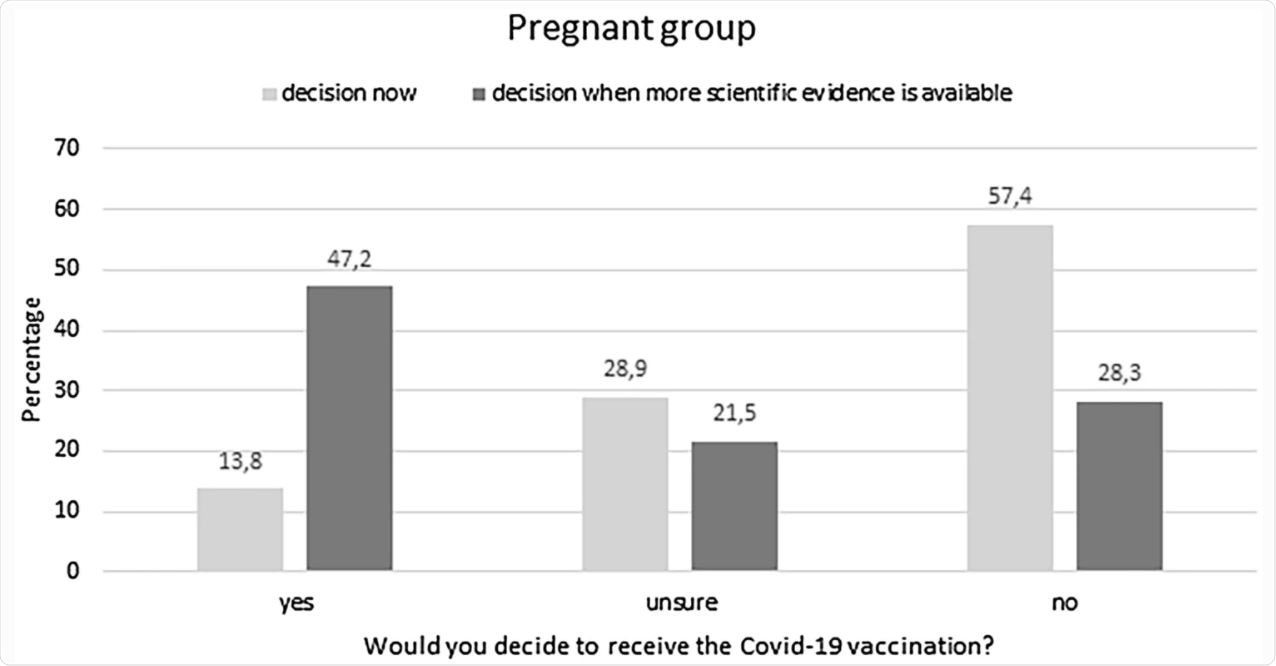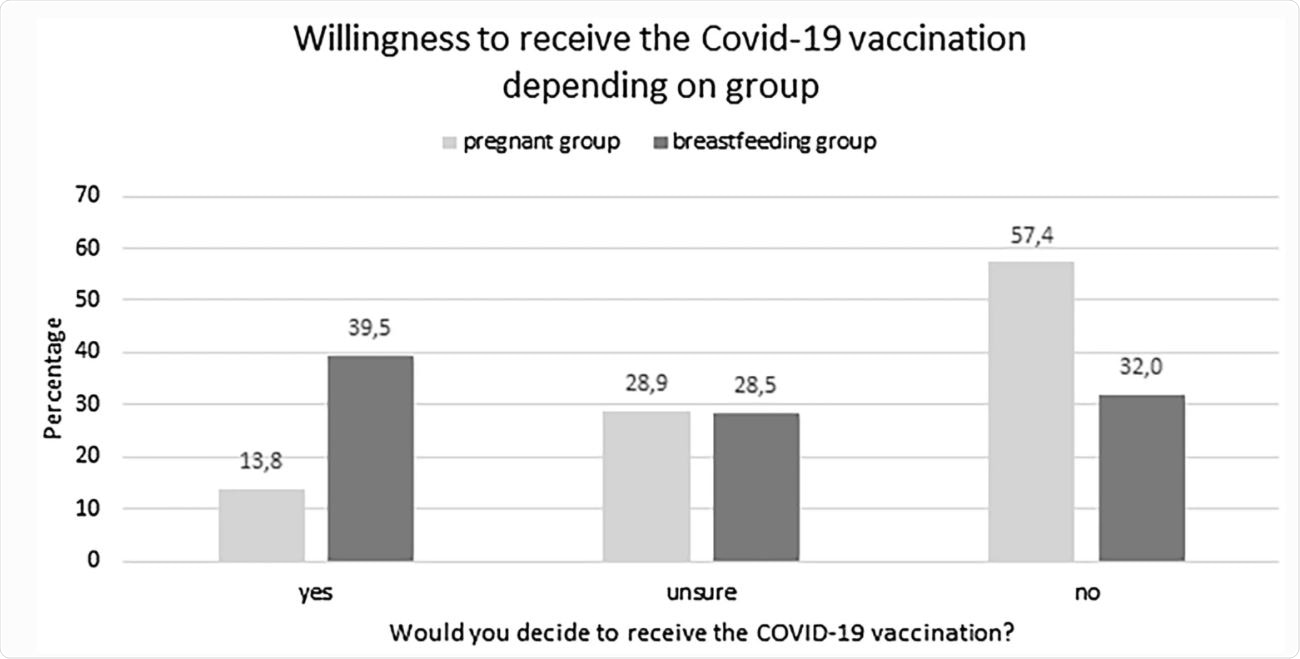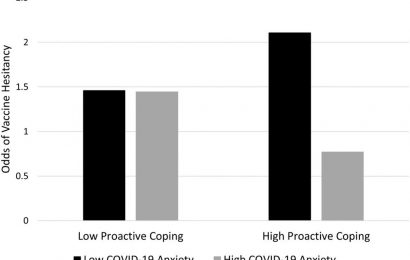Although severe acute respiratory syndrome coronavirus 2 (SARS-CoV-2) vaccination is one of the most important ways of fighting the ongoing COVID-19 pandemic, the recommendations for vaccination for pregnant and breastfeeding women are not consistent.
Researchers from Germany recently conducted an anonymous, cross-sectional online survey among pregnant and breastfeeding German women between 30 March and 19 April 2021. The study's objective was to explore the attitude of pregnant and breastfeeding women in Germany towards COVID-19 vaccination. The survey addressed COVID-19 vaccination attitudes and the underlying reasons for these attitudes. The survey also evaluated the anxiety related to a symptomatic course of SARS-CoV-2 infection. The research paper is published in the journal Archives of Gynecology and Obstetrics.
.jpg)
Participants for the survey, which was administered through soscisurvey.de, were recruited via gynecologists, midwives, and social media platforms such as Facebook and Instagram.
At the time of recruitment of participants, only about 10% of the German population were vaccinated, and only older adults aged 70 or above, people belonging to specific risk groups such as hospital and medical staff, and people with comorbidities were eligible for COVID-19 vaccination.
Pregnant or breastfeeding women in Germany were not officially eligible for COVID-19 vaccination at the time of participant recruitment.
Results show that breastfeeding women were more willing to receive vaccines than pregnant women
A total of 2,339 women completed the survey; 1,043 of them were pregnant and 1,296 were breastfeeding at the time of the survey. Over 57% of the pregnant women did not have a favorable attitude towards receiving the vaccine, 28.8% were unsure, and only 13.8% responded positively to getting vaccinated at the time the survey was conducted. However, over 47% of the women mentioned that they would be in favor of receiving the vaccine if they were provided with more scientific evidence on vaccine safety in pregnant women.
Breastfeeding women were more willing to get vaccinated compared to pregnant women with 39.5% of breastfeeding women in favor of getting vaccinated, 32.5% not in favor, and 28.1% being unsure.
As per the survey, the willingness to get vaccinated was significantly related to the anxiety levels of the women about getting infected and developing COVID-19 symptoms.
Key reasons for vaccine hesitancy were the perception that vaccination-specific information and scientific evidence on vaccine safety are insufficient and the fear that vaccines may harm the fetus or infant.

Findings highlight the importance of studies on vaccine safety and efficacy in pregnant women
The results show that nearly 60% of pregnant women are not in favor of getting vaccinated at the time of the survey, which agrees with the results of a similar study conducted among pregnant women in Italy in January 2021.
More importantly, the survey responses show that many of the vaccine-hesitant pregnant women would be willing to get vaccinated if more evidence is provided about the safety of vaccines in pregnant women. This highlights the importance of scientific studies on vaccine safety and efficacy in pregnant women.

Although the acceptance rate for COVID-19 vaccination among breastfeeding women was higher than that among pregnant women, a large number of breastfeeding women were also not sure or not in favor of receiving the vaccine.
The major reasons for vaccine hesitancy in both groups were perceived lack of sufficient information about the vaccines and limited scientific evidence about vaccine safety in their groups. Women in both groups were also anxious about the vaccine causing harm to their offspring.
According to the authors, healthcare professionals should inform pregnant and breastfeeding women about the benefits and risks of vaccines to protect them from the complications of a SARS-CoV-2 infection.
"Studies have revealed increased anxiety and levels of pregnant women during the pandemic highlighting the psychological impact of the pandemic on this sensible group."
Moreover, in the breastfeeding group, the data show that the greater the anxiety regarding severe COVID-19, the higher the vaccine acceptance. Also, breastfeeding women at high risk of contracting SARS-CoV-2 had higher vaccine acceptance.
In the pregnant group, interestingly, vaccine acceptance was not associated with severe COVID-19 risk factors. In conclusion, the survey findings could have important implications for obstetrical care during the COVID-19 pandemic and official recommendations and information strategies about the COVID-19 vaccination.
"The here presented results emphasize the need of scientific studies which show the safety of the COVID-19 vaccination for pregnant and breastfeeding women to increase the acceptance of and trust in the vaccination."
- Schaal, N.K., Zöllkau, J., Hepp, P. et al. Pregnant and breastfeeding women's attitudes and fears regarding the COVID-19 vaccination. Arch Gynecol Obstet (2021). https://doi.org/10.1007/s00404-021-06297-z, https://rd.springer.com/article/10.1007%2Fs00404-021-06297-z
Posted in: Device / Technology News | Medical Research News | Women's Health News | Pharmaceutical News
Tags: Anxiety, Breastfeeding, Coronavirus, Coronavirus Disease COVID-19, Efficacy, Healthcare, Hospital, Medicine, Pandemic, Research, Respiratory, SARS, SARS-CoV-2, Severe Acute Respiratory, Severe Acute Respiratory Syndrome, Syndrome, Vaccine

Written by
Susha Cheriyedath
Susha has a Bachelor of Science (B.Sc.) degree in Chemistry and Master of Science (M.Sc) degree in Biochemistry from the University of Calicut, India. She always had a keen interest in medical and health science. As part of her masters degree, she specialized in Biochemistry, with an emphasis on Microbiology, Physiology, Biotechnology, and Nutrition. In her spare time, she loves to cook up a storm in the kitchen with her super-messy baking experiments.
Source: Read Full Article


